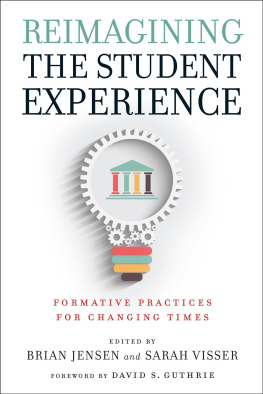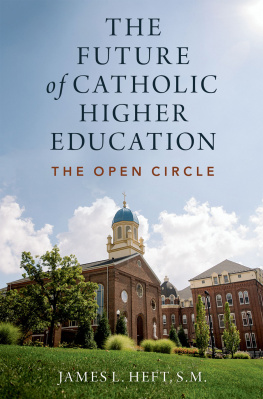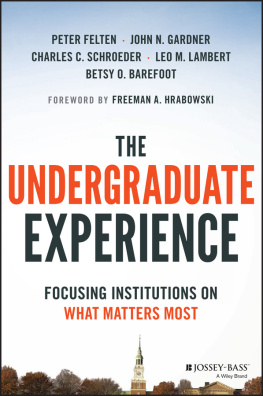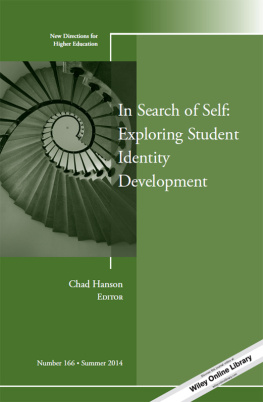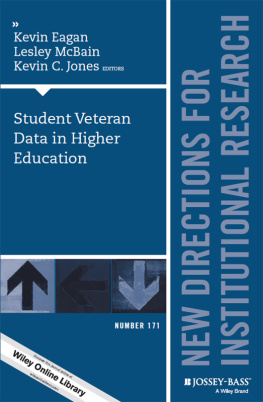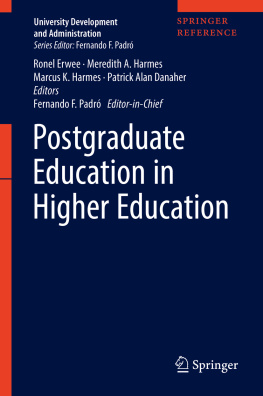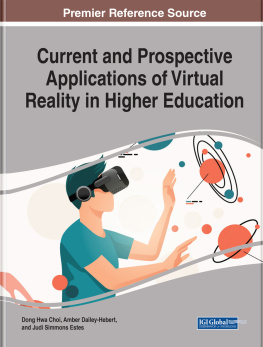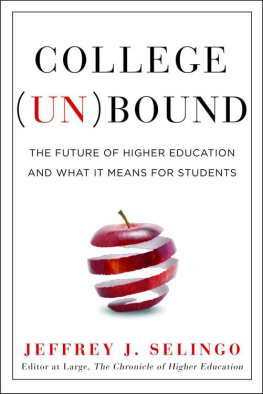DAVID S. GUTHRIE
W riting fifty years ago about Protestant denominations and their colleges, sociologistsChristopher Jencks and David Riesman were considerably sullen regarding their futurewithin the larger postsecondary landscape. They opined:
Lacking the resources to build a clientele on the basis of academic distinction,the location to build it on the basis of physical convenience, the connections tobuild it on the basis of social snobbery, and the competence to build it on the basisof professional training, they will cling to their religious labels in order toescape complete anonymity.
Although significant internal and external challenges certainly persist today, Isincerely believe that Christian colleges and universities have not settled for thebenign insignificance with which Jencks and Riesman seemed to view them. Instead,for more than a generation now, many of these institutions have attemptedalbeitimperfectly, incompletely, and haphazardlyto maintain a sharply defined religiousidentity while also participating meaningfully in... intellectual and culturallife...
In no small way, the conversations of which I was honored to have been a part morethan twenty years ago, and the little book that tried to capture at least some ofthemStudent Affairs Reconsidered: A Christian View of the Profession and Its Contextsflewunder the flag described above, and hopefully furthered the cause. As noted in thebooks introductory pages, one of the deepest hopes of its authors was that
those familiar with Christian faith who are also involved in higher education maybecome more engaged and empowered to undertake their efforts with the understandingthat programs offered, classes taught, discipline dispensed, committees formed, counselingoffered, friendships nurtured, policies framed, colleagues hired, and so on, arethe very arenas in which Christian faith must take shape by Gods grace and for Godsglory.
Brian Jensen and Sarah Vissers book testifies loudly and clearly that our nascenthopes in years gone by are alive and well, and perhaps even flourishing. Their visionfor the book, evidenced in the introduction that follows, offers a compelling witnessto the good and important and challenging work that is ours as Christian educatorsseeking to signpost Christs kingdom on college and university campuses. And thechapters that comprise this volume illustrate the increasing maturity of the waysin which Christian faith is intended to frame, enlighten, and empower the works ofour hands. Psalm 71:18 speaks of declaring Gods power to the next generation, Godsmighty acts to all who are to come. May it be so of this book, O Lord, in equippingthose who read it with a vision for faithfulness in that part of your kingdom calledcolleges and universities.
Notes
Christopher Jencks and David Riesman, The Academic Revolution (Garden City, NY:Doubleday & Company, 1968), 333.
M. A. Noll, The Future of the Religious College: Looking Ahead by Looking Back,in The Future of Religious Colleges, ed. Paul J. Dovre (Grand Rapids: Eerdmans, 2002),7394.
Irene Alexander, A Glimpse of the Kingdom in Academia: Academic Formation as RadicalDiscipleship (Eugene, OR: Cascade Books, 2013).
David S. Guthrie, Introduction, in Student Affairs Reconsidered: A ChristianView of the Profession and Its Contexts, ed. David S. Guthrie (Lanham, MD: UniversityPress of America, 1997), ixxii.
BRIAN JENSEN AND SARAH VISSER
T he times they are a-changin, sang Bob Dylan in his song by the same name. Indeed,this is a sentiment felt deeply by those of us working in the field of higher educationas we have witnessed significant transformation during recent decades. For thosein faith-based institutions, the impact of change and transformation has been particularlyacute. And though it would be easy to bemoan the tumultuous nature of our work, webelieve this is one of the most exhilarating times in the history of higher educationto be engaged in the work of student development and campus leadership.
In ancient Greek, kairos means the right, critical, or opportune time for action.Rather than settling for a mere chronological perspective on time, we see this seasonas a kairos moment. The time is right for a resource that equips student affairsprofessionals to navigate the terrain of twenty-first-century higher education froma faith-based perspective. This project aims to capture, with enthusiasm and optimism,a vision for the work moving forward. In the pages that follow, we set out to addressthe complexity and need for creativity through the lens of hope and conviction.
The current academy encounters daily challenges: rising tuition in the midst of federalfunding cuts, expectations around accessibility and affordability, and academicfreedom juxtaposed with governmental regulations. In addition, higher education practitionersmust navigate the rocky terrain of Title IX, standardized outcomes, the rise in mentalhealth severity and reporting, identity politics, technology dependence, waning studentsatisfaction, discrimination, shrinking high school graduate populations... andon it goes. This field of work is not for the faint of heart.
Higher education stands at a crossroads. One path is calling for adaptation to thedemands of the marketplace. This voice encourages institutions to run like Fortune500 companies, with complete customer satisfaction and a proper return on investment.The second path beckons institutions to stick with ideals that have endured centuriesof changes. What are we to do? At times, we fall prey to the misconception that wemust pick one path or the other, falsely assuming that the two are mutually exclusive.And yet, our instincts suggest that there is an alternative, a third way that recognizesour current realities but also embraces the latent possibility of what higher educationcould and should be.
The future of Christian higher education requires thriving leaders who hold fastto time-tested principles while adapting to current trends with wisdom and innovation.As we surveyed the current landscape of the field with a future-focused posture,we found ourselves hungry for a resource that would equip Christians working in theprofession with fresh perspectives and renewed vision. The book you hold in yourhands is our attempt to do just that. It is a collaboration of voices from peopledevoted to the endeavor of Christian higher educationvoices that enrich the conversationsurrounding student affairs practices for our own time. It offers professionals arobust vision of what flourishing can look like for todays college student. Thisproject invites student affairs professionals, graduate students, faculty, and administratorsto think deeply and Christianly about the various areas of their work.
There are a variety of pathways that Christians follow within the higher educationsector. Some practice their trades within colleges or universities that have Christiancommitment at the core of their institutional missions. Others feel called to workwithin public institutions or private institutions that are not affiliated witha particular faith tradition or confessional approach. And while the differencesbetween these types of leaders and institutions are plentiful, there is much thatunites us, not the least of which is our shared desire to seek to understand howa Christian perspective of higher education informs our practices. The editors andauthors of this collection have spent time in a variety of institutions and geographiclocations, and can attest to both the similarities and differences across the broadspectrum of institutional types and affiliations. And while the context of thisparticular work is largely based in North America, we believe the reflections andaspirations captured here are relevant and relatable to colleagues across the globe.This current project stems from a collective longing to see Christ-centered highereducation done well. It aims to foster a shared commitment to cultivating transformationallearning experiences for increasingly diverse communities of students.

